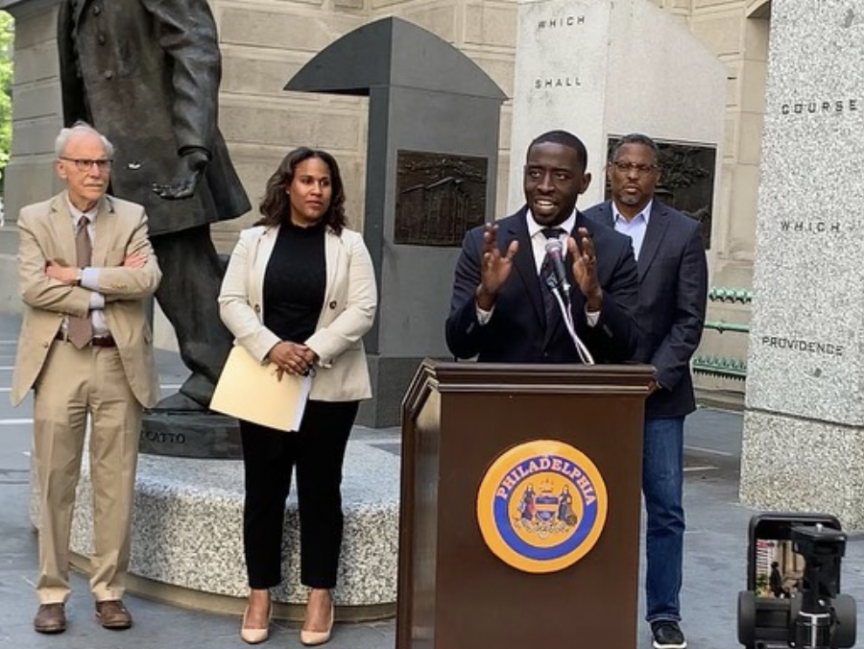Effective today, 8 minor vehicle violations will not be enforced with a traffic stop
PHILADELPHIA, PA — Driving Equality, which ends the traffic stops that promote discrimination while keeping the traffic stops that promote public safety, is now enforceable law in the City of Philadelphia. These violations include:
- Late registration (with a sixty day grace period)
- Relocation of temporary registration (must be visible)
- Relocation of license plate (must be visible)
- Missing a single brake light
- Items hanging from the rear view mirror
- Minor Bumper issues
- Driving with an expired inspection sticker
- Driving with an expired emission sticker
This approach seeks to redirect police time and resources towards keeping Philadelphians safe while removing negative interactions that widen the divide and perpetuate mistrust. In addition to the historic nature of this legislation, this groundbreaking process brought all parties to the negotiating table to ensure that this civil rights issue is elevated without compromising on the safety and well-being of Philadelphians.
“When I’ve been pulled over for a minor motor vehicle code violation, I’ve felt traumatized and humiliated,” said Councilmember Isaiah Thomas. “As a young, Black man from Philadelphia – I never imagined this day would come. I am humbled to have the partnership with the Mayor’s Administration, Philadelphia Police Department, Public Defenders Association of Philadelphia and other advocates. The data and the lived experience have led to this historic solution and I look forward to hearing how Driving Equality bridges divides in Philadelphia.”
Last October, City Council passed Councilmember Thomas’ Driving Equality bills with an overwhelming majority. This bill was crafted through a working group consisting of representatives from Councilmember Thomas’ office, Defenders Association of Philadelphia, Philadelphia Police Department and Mayor Kenney’s policy and legal teams. Once passed by City Council, Mayor Kenney cemented the law with an Executive Order last November. The City Council bills and Mayoral Executive Order gave Philadelphia Police three months for training and education before enforcing Driving Equality. After internal training, Driving Equality is enforceable effective today, March 3, 2022.
“I was proud to sign an executive order to implement the legislation set forth in the Driving Equality bills last fall, which is needed to address the disproportionate number of traffic stops experienced by people of color in Philadelphia,” said Mayor Jim Kenney. “Introduced and spearheaded by Councilmember Thomas, this historic legislation banning traffic stops made solely for these minor offenses will help to heal police-community relations and ensure the best use of our limited police resources.”
Mayor Kenney signed a Driving Equality Executive Order November 3, 2021 to reinforce the need and support of this legislation. Following his signature, Philadelphia Police Department created education and training materials with 120 days to prepare the force for this policy change. Prior to training and education, Philadelphia Police leadership participated in negotiations to ensure that Driving Equality achieves Councilmember Thomas’ goals without negatively impacting public safety.
“The Driving Equality Bill introduced by Councilmember Thomas is an important step towards reducing the racial inequities identified in vehicle stops conducted in our city,” said Police Commissioner Danielle Outlaw. “The PPD is not abandoning or being prohibited from enforcing the eight secondary offenses identified; rather, the bill and executive order modify how enforcement will occur. All the safety laws remain on the books and may be enforced when a driver is stopped by police for any other primary offense.”
A companion bill requires the Philadelphia Police Department to record information on each vehicle stop into an electronic database to be posted publicly as well as shared with City Council and the Citizens Police Oversight Commission. Additionally, Councilmember Thomas is establishing a working group to monitor the implementation and data surrounding Driving Equality.
# # #


